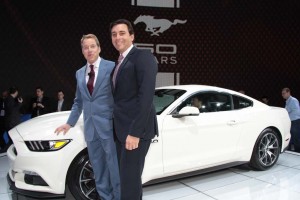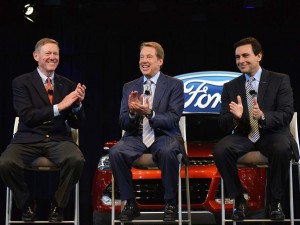Ford CEO-designate Mark Fields is happy to have been tapped by Ford chairman Bill Ford and the Dearborn automaker’s board of directors to succeed CEO Alan Mulally this July. But it wasn’t always so.
The day before Bill Ford announced that Alan Mullaly as CEO on Sept. 5, 2006, word of the Boeing Co. executive’s arrival at Ford was handed out to the senior staff, including Americas President Fields. After the meeting, Fields, who has long had a special relationship with Bill Ford, appeared in the scion’s office door with what Bill Ford described in an interview with me in 2007 as what might be described today as a “WTF expression.”
Fields, then President of the Americas, had already started weaving the narrative in his head that he would, or at least might, succeed Bill Ford as CEO of Ford. The arrival of Mulally, an outsider, was throwing that story off the tracks. “I told him (Fields) very frankly that Alan was going to make him a much better CEO when his time came,” Bill Ford related in an interview with me.
Fields had logged some successful stops on his Ford journey. And he had put together a “Way Forward” plan to get Ford out of the financial and operational gutter. That plan was announced in early 2006. But by May, the plan was already deemed insufficient to stem the losses. Way Forward II was hatched, with Fields as the lead architect, and Bill Ford told his board that he was starting to look for his own replacement. He was admitting that he did not have the right set of skills to get Ford on track – but that Fields was not ready.
(A “love fest” at Ford annual meeting as shareholders say goodbye to CEO Mulally. Click Herefor the story.)
Eight years later, Fields has demonstrated himself to be both an excellent student, as well as strong leader inside Ford. “Alan brought vital change to the company,” Fields said in a December interview. “He made it so people could share problems with one another and work on solving them together…that may sound basic. But believe me, the Ford he took over was a pretty paranoid place, especially the higher you went in the company and showing others that you had a problem you couldn’t fix without them knowing about it was a sign of weakness.”
Fields says he doubts that level and breadth of change in the company’s culture would have ever come about without a change agent from outside the company. And it’s what Bill Ford was talking about when he told Fields that he still had things to learn about being a CEO that he wasn’t going to learn from Ford himself.
Mulally is a tough act to follow. But that is not to say that Fields can’t, or won’t create his own era at Ford.
While Mulally has been a good face and voice representing Ford and its transformation, he has been using the same set of six or so talking points for eight years in interviews. Fields, who has always been more edgy and forthright with the media than Mulally, is a good story-teller when he wants to be. He can use those skills to tell a better story around Ford.
(Ford spending $1.8 billion on new stock buyback. Click Here for details.)
While a good CEO has to care about the share price, he or she shouldn’t obsesses over it to the point of sacrificing good long term objectives for short-term ones meant to move the share price in a given quarter. Still, Ford shares have languished in the $14 to $17 range over the past six months, and Fields will now need to instill higher investor confidence.
Ford powertrain quality has improved over the years, but it has lost ground on third-party ratings by Consumer Reports and J.D. Power and Associates because of sometimes balky new tech like MyFordTouch and Sync. He can make a mark by ruthlessly holding engineers accountable for making the systems and new customer interfaces simpler. Ford has been smoked in this area by Chrysler’s Uconnect system.
(Ford earnings fall 40% for first quarter. Click Here for the full story.)
Fields must address the luxury business with boldness. The Lincoln brand is not the answer to taking on BMW, Lexus, Mercedes-Benz or even Cadillac. He could disrupt the Lincoln product plan, take the billions already earmarked for the brand, add about $5 billion and start a new brand from scratch as Toyota did with Lexus 25 years ago. Fields has the smarts and leadership to make that investment pay off. And it could define his term as CEO.
There are other challenges to deal with, from the long-awaited European turnaround to the revitalization of Lincoln which is apparently betting its future on its launch this year in China. Fields will soon be called on to demonstrate that the eight years Mulally served as his mentor has transformed him into the seasoned CEO Ford now needs.



I’m not the Mark Fields in this story but I have followed his progress through Ford for many years now. I first became interested in him when my wife was looking for a replacement van for her older GM Safari. We tested a few models and she became interested in the Mazda MPV. I researched the model and in the process learned about Mark Fields who was heading Mazda.
There was a time when I would not think of buying a car that was not of the “big three”. Then there was an era when I would not consider ANY of those makes because of what had happened in Detroit.
I’m very happy to say I picked out a brand new Ford Edge last fall and love driving this car. I plan to buy Fords in the future.
Mark Fields
(not the Ford CEO-designate).